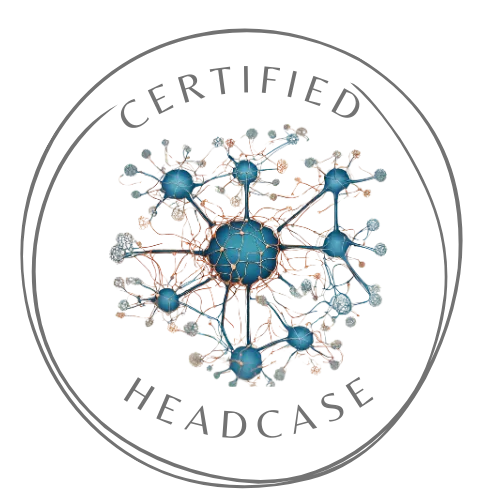TBI Recovery Through AI
One Story at a Time
Embrace Your Journey
Welcome to
Certified Headcase
Journey to Recovery: Embracing Change Through Innovation
Discover the power of personal transformation at Certified Headcase, where each story unfolds a new chapter of recovery and resilience. Like many others, my journey has been about overcoming and adapting to the challenges life throws our way, including living with aphantasia after a traumatic brain injury (TBI).
Here, I share my experiences and the tools, insights, and breakthroughs that have shaped my path to recovery. We also explore the profound impact of personal narratives on healing and growth, mainly focusing on the neurological effects
.
of TBI leading to aphantasia and the various recovery methods for aphantasia post-TBI. While Certified Headcase is not yet a community with interactive support, it is a place to find inspiration and resources.
Whether navigating your recovery or supporting someone through theirs, you’ll discover stories that celebrate strength, uncover vulnerabilities, and promote an understanding of healing. It’s time to see beyond the challenges and embrace the journey—one story at a time.
Navigating
Aphastasia and TBI
Dive into inspiring stories and practical resources to support your unique recovery journey. Discover specialized tools and insights that foster resilience and personal growth. Engage with content that enlightens and empowers—start your journey here.
The Ghost in My Brain:
Discovering "The Ghost in My Brain" was a turning point in my journey. This book, detailing a recovery from a brain injury similar to mine, was the affirmation I desperately needed amidst the uncertainty of my condition.
The 5 Second Rule
Mel Robbins became a beacon of hope during a pivotal time in my life. Her story of overcoming substantial debt, anxiety, and personal challenges through the discovery of the "5 Second Rule" resonated deeply with me.
Super Human
Discovering biohacker Dave Asprey and Bulletproof Coffee was pivotal in my recovery. His personal triumph over black mold's brain impacts inspired my path toward healing and self-optimization.
Frequently Asked Questions
Here's some answers to the most common questions we get asked:
What inspired you to start your journey of recovery?
My journey began after a traumatic brain injury and discovering I had aphantasia. I was inspired by others' stories, like Dave Asprey's battle with mold exposure, to take an active role in my own healing process.
Q: How has biohacking played a role in your recovery?
Biohacking allowed me to experiment with lifestyle changes that improved my overall well-being. Innovations like Bulletproof Coffee introduced me to the impact of diet on cognitive function, leading to significant personal health improvements.
Q: Can you explain what aphantasia is and how it affected you after your TBI?
: Aphantasia is when your brain doesn’t form or use mental images as part of your thinking or imagination. After my TBI in 2016, I lost this ability, which had been a vibrant part of my creativity and daily life. My dreams, once vivid and a source of inspiration, became blank. This profound change left me navigating a world without mental imagery, adding to the initial confusion and adjustment challenges post-TBI.
How did finding out about your TBI change your approach to recovery?
Learning about my TBI shifted my recovery from a path of uncertainty to one of self-education and proactive strategy. It made me question standard medical advice and seek alternative therapies and supportive communities.
What strategies have you found most effective for adapting to aphantasia?
Adapting to aphantasia involved relearning how to connect with my memories and thoughts without visual imagery. Breathwork has been instrumental, helping to focus and center my thoughts through sensory experiences rather than visual cues. I've also embraced other forms of creativity and memory aids, such as verbal storytelling and tactile engagement, which allow me to experience the world and recall my past in new, meaningful ways.
What advice would you give to someone starting their recovery journey?
My advice is to be your own advocate. Research, connect with supportive communities, and don't be afraid to try new approaches. Recovery is personal and nonlinear, so honor your pace and what feels right for your body and mind.
How has your understanding of healing evolved since your TBI and diagnosis with aphantasia?
My understanding of healing has profoundly transformed since my TBI and subsequent realization of aphantasia. Initially, healing seemed to be about returning to how things were before my injury. However, I've learned that it's more about adaptation and growth. Healing isn't a linear process or a return to a former state, but rather an ongoing journey of discovering new ways to interact with the world and embrace my changed cognitive landscape. This shift in perspective has encouraged me to explore new tools and approaches, leading to deeper self-awareness and resilience.



